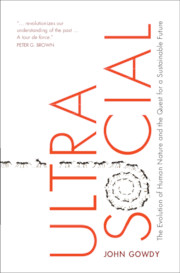Part I - The Evolution of Human Ultrasociality
Published online by Cambridge University Press: 09 October 2021
Summary
Homo sapiens has been present on planet earth for at least 300,000 years. For almost all that time we lived as immediate–return hunter gatherers. During this period we evolved the basic traits that make us human. We lived in small bands where virtues like altruism, sharing, and the preservation of nature were essential to group survival. Our societies were sustainable and egalitarian. Hunter-gatherers show us that neither environmental destruction nor extreme inequality is due to human nature. Both are the result of the requirements of production for surplus that came with agriculture. Over the last 10,000 years human society became ultrasocial, that is, it became so complex, stratified, and interconnected that it began to act as if it were a single self-regulating superorganism.
- Type
- Chapter
- Information
- UltrasocialThe Evolution of Human Nature and the Quest for a Sustainable Future, pp. 1 - 86Publisher: Cambridge University PressPrint publication year: 2021



